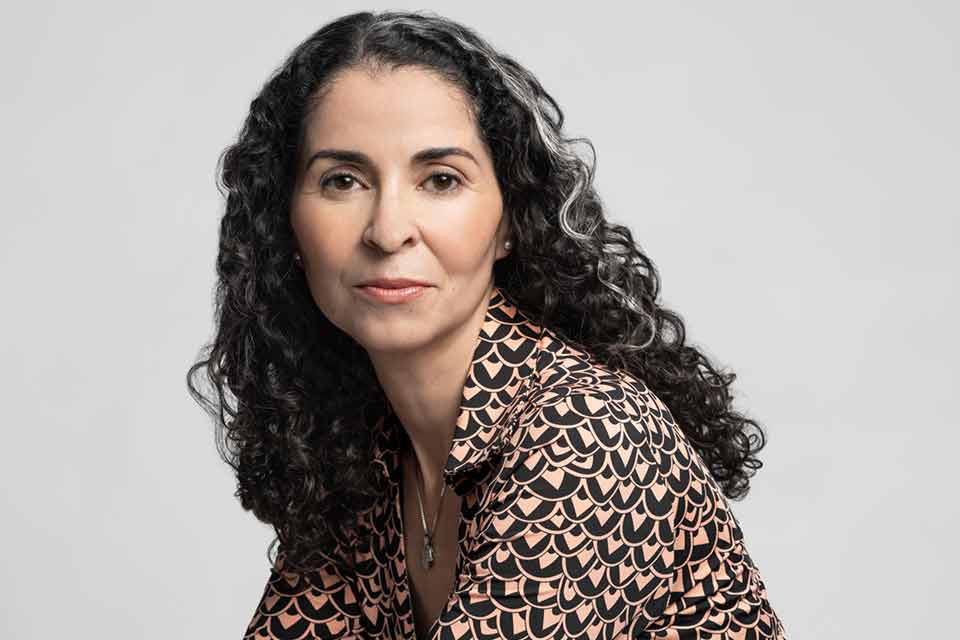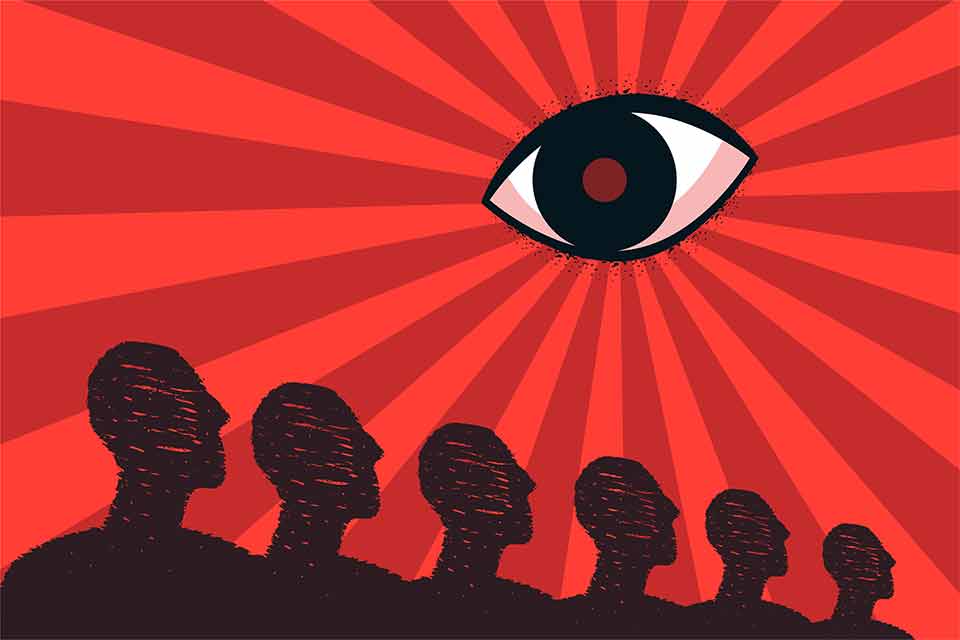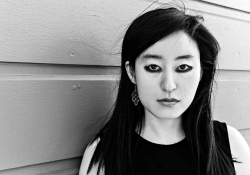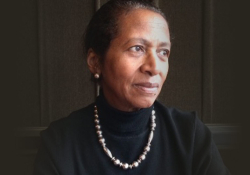Punishment Without Crime: A Conversation with Laila Lalami

I met Laila Lalami several years ago at a gathering in the hills overlooking downtown Los Angeles. I was a new student in the MFA program where Lalami is a distinguished professor, and I was attending my first event (I was, in other words, shaking in my baby writer boots). Lalami was decked out in a sun hat and inviting smile. But I could sense a fierceness in her, too. Her gaze was intense. She stood tall and straight. I thought, Now here is a formidable person.
Lalami’s work, like her real-life presence, is unflinching. Her latest novel, The Dream Hotel, takes a harrowing look at data-driven surveillance. The story follows Sara, an archivist and mother whose life is stolen from her when a border agent sends her to a retention center. The justification? Data gathered from a product called a Dreamsaver—a device that gives its users perfect sleep while also monitoring their dreams—flag Sara as a potential threat. She’s punished for a crime she hasn’t yet committed, for a dream.
I’m tempted, and believe it would be fair, to label The Dream Hotel “dystopian.” After all, a futuristic technology triggers Sara’s plight. But I worry that by using this term, I imply its dangers are in the distant future. This isn’t the case. During the 2016 election, President Trump’s former adviser used private data to target American voters; the US Sentencing Commission employs a data-driven algorithm to determine the likelihood of future crimes; and the fate of TikTok hangs in the balance as the federal government debates its access to user data. Perhaps I’m uncomfortable with the term only because I don’t want to think of my daily reality as dystopian. But as Lalami explained once we settled into our interview, her novel takes current circumstances to their logical conclusion. In doing so, The Dream Hotel asks us what levels of surveillance we’re willing to tolerate and when, exactly, we will summon the courage to resist.
Emily Doyle: At the beginning of The Dream Hotel, Sara comforts herself with the thought that she isn’t like the others under retention—they’re dangerous; she isn’t. But the longer Sara remains captive, the more she realizes she’s just like everyone else. Everyone in retention is there because the government has gathered, with the help of a private company, data suggesting they’re a threat. The problem is that the data tells a story that isn’t necessarily true. Talk to me about the difference between data and truth.
Laila Lalami: Well, Sara assumes the system works. It’s only when she finds herself entrapped by that system that she starts to question it.
Through her, the book asks you to consider whether the millions of data points that you have allowed private companies to collect might someday be used against you. Think about it: every text you’ve sent, every email you’ve written, every purchase you’ve made, every picture you’ve taken. Are you sure that this massive archive doesn’t include a crime, or at least a transgression? Don’t forget that the line between what is legal and what is illegal shifts all the time, depending on who’s in power. For example, miscegenation used to be a crime. Now, thankfully, it’s not. Whether you’re a criminal depends, often, on where that line is drawn.
Don’t forget that the line between what is legal and what is illegal shifts all the time, depending on who’s in power.
Doyle: That is a terrifying thought. So much of this book terrifies me. Actually, it’s been a few months since my initial read, and there’s a particular line that still haunts me: “Being surveilled all the time, even in her sleep, has made her unsure what to believe about herself.” When I read that, I wondered, Who is Sara? Not because Sara isn’t a distinct person, but because the novel seems to purposefully trouble the idea of a stable self.
Lalami: The novel absolutely challenges this idea. What makes one person distinct from another isn’t just having a separate body, it’s also having private thoughts. A dream, for instance, is a very intimate thing; you experience it alone. Dreams are where our souls roam free, where long-dead relatives visit us, where we fly into space and untether ourselves from the judgment of others.
But if everything is surveilled, then everything is essentially public. Now, surveillance isn’t neutral. People often modify their behavior in response to it. In the novel, I wanted to explore what that modification does to the self. If you change your behavior because you’re being surveilled, how do you know who you are? Because, at that point, you’ve internalized a system of control. It’s a type of predation that we’re just now beginning to experience and understand as a species, across the globe.
Doyle: It seems like a colonization of the mind.
Lalami: That’s precisely what it is. Once data collection penetrates our minds, we lose our freedom and identity.
Doyle: Yet it sounds like part of your political project with this book is allowing Sara to maintain some sense of herself.
Lalami: Yes, despite all the surveillance under which Sara lives, she has . . . well, you might call it the soul, depending on your cosmology. But she has within her an individual self. For example, in the first pages of the book, an orderly comes to check her Dreamsaver, which is implanted behind her ear, and she refuses to lean forward to make it easier for him to complete the check. It’s a tiny act of resistance, and it makes Sara who she is.
Doyle: That reminds me of another moment when Sara musses her hair in violation of the retention center’s rules, and she thinks, That’s better. To me, this is Sara.
Lalami: Exactly. Even though she’s forced into a retention center, where she has to wear a uniform and follow the rules, she still asserts herself in that small way. She refuses to cede that small amount of power. Of course, I recognize that Sara is locked in a system, and there are limits to individual action. Ultimately, that’s why she arrives at freedom only through collective action.
Doyle: What you’re saying is beautiful, especially because it’s not very outcome-focused. It’s process-focused. It’s not as much about whether Sara wins but whether she tries—and whether she convinces others to join her.
Lalami: That’s right. I didn’t want the book to lead toward a perfect outcome. Because first, I think that’s clichéd, and second, the book is not attempting to comfort you about this surveillance future. That’s what makes it a disturbing read.
Doyle: The Dream Hotel has not comforted me. It has inspired me, though, which is more important. But something with which I’ve wrestled is the idea of choice and agency in this book, because of the Dreamsaver.
Sara’s trouble begins when she gets her own Dreamsaver, a device that gives her perfect sleep every night. It’s a miracle technology. But of course, the Dreamsaver also leads to her retention when her dreams identify her as a threat. So technically, yes, Sara makes the choice to get the Dreamsaver, but I must wonder whether Sara, a sleep-deprived parent, really has a choice when someone’s offering her dramatically improved sleep.
Sara seems to wonder about this, too. Her choice, or lack of choice, is expressed through the various timelines in this novel. There’s the present timeline, where we pick up with Sara midretention, and the past timeline, which explores how Sara landed in retention in the first place. But there’s also a hypothetical present, which Sara refers to as her shadow life, the “one she would still have if she hadn’t gotten the implant, hadn’t been detained at LAX on her return from London.” What role does this shadow life play?
Lalami: You know, I never thought about her shadow life as a timeline. I thought of it as daydreaming. But I love this idea that it’s a timeline. Anyway, her shadow life is her free life. It’s the spark within her that wants to be free. Projecting herself into a hypothetical present, where she chose differently, helps her cope and develop ideas of resistance.
Doyle: Chance also plays a role in Sara’s retainment, though. For me, one of the tensest points in the novel was when Sara’s initial interview with the border agent turns south. I’m thinking of this moment: “Segura leafed through the passport again. She had the feeling that he was about to stamp it, because he reached for the desk drawer with his other hand.” Of course, the agent never stamps her passport, and she ends up in retention. Can you discuss the presence of chance in The Dream Hotel?
Lalami: Well, it’s such a thin line, right? Choice or chance. I think about it all the time, in my work and life. For example, one morning thirty years ago I walked into an elevator and literally bumped into the man who’s now my husband. If I had taken the next elevator, my life would have gone down a completely different path, and I might not even be sitting here.
Sara’s choices during that moment reveal the arbitrariness of the law. Because the law is a discourse of power. Not to get all Foucault on you, but that’s what it is. The same crime committed by two different people might be punished very differently. Or one might not be punished at all. Sara provokes an agent who’s having a bad day. That’s her tragic mistake.
Doyle: This is part of what I find so captivating and challenging about The Dream Hotel. It’s balancing all those things—the arbitrariness of life against choice, the systemic injustices we face against the value of resistance. It never provides an easy answer. The story constantly presses me into this place of thinking, Okay, at least keep moving. At least keep fighting.
Since it’s Sara’s dreams that ultimately flag her as a threat to the border agent, I’m curious: How has your dream life changed through working on The Dream Hotel? And are we accountable for our dreams?
Lalami: I’ve paid much more attention to my dreams. I used to be one of those people who didn’t always remember them. Also, I do not believe that dreams are random. In fact, neurologists who study dreams can’t explain them fully. I can give you examples of unexplainable dreams.
Doyle: I’d love to hear one.
Lalami: Oh, here’s an example from Nathan Thrall’s nonfiction book, A Day in the Life of Abed Salama, which is set in the West Bank. Abed’s son, Milad, is on a field trip when his school bus collides with a trailer and burns. The book is about Abed trying to reach the scene of the accident to find Milad, and this ordinary journey is made extraordinarily complicated because of the Israeli occupation and segregation of roads.
One of the minor characters in the book is a child who, a few days before the field trip, tells his mother that he’s going to die. His mother says something like—and I’m paraphrasing here—“My God, nothing’s going to happen to you. But what are you talking about?” Leading up to the field trip, the child keeps saying things like, “Are you going to buy me this shirt? Because that’s the shirt that I’m going to wear when I die.” The mother is distraught, but the child does end up going on the field trip, and he does die. So, his dream was really a premonition. This is just one example. If you ask people about their dreams, you’re going to hear all kinds of stories that science cannot explain.

If you ask people about their dreams, you’re going to hear all kinds of stories that science cannot explain.
While I was working on the book, I started thinking more about my dreams and talking about them with my husband over breakfast. I’ve come to believe that dreams are a product of the imaginative brain, not the judging brain. They’re important, but we’re not responsible for them.
Doyle: It’s a fascinating thought—what parts of us are represented in our dreams, what they do and don’t reveal about our identities. I’m not sure you’d remember this, but speaking again of the self, you once told me that you reinvent yourself for each book. In some ways, though, I can see a consistent Laila Lalami across your works. To me, she’s a writer concerned with perspectives that run counter to colonial narratives. But this common thread doesn’t necessarily relate to how you write each book. Would you say you have a discernible style or voice? Or do you truly and radically remake yourself with every project?
Lalami: It’s interesting that that’s how you think about my books. I would say it’s probably true. I would broaden it beyond colonialism, though, to systems of power. But anyway, my problem as a writer is that I get bored.
Doyle: Your problem and your gift.
Lalami: Yes, maybe! But I get bored, and so I always want to try something I haven’t tried before. I tried to write this book from the perspective of a person developing the Dreamsaver at a tech company. But I couldn’t find energy in that approach. I couldn’t get past the first seventy pages. Then, during the pandemic, I wrote a draft from the perspective of someone who actually gets a Dreamsaver and ends up in retention. Initially, that character was a man.
Doyle: You’re kidding!
Lalami: No, I wrote a complete draft of the novel with the protagonist as a man.
Doyle: That’s shocking to me, because Sara’s womanhood is so important to the story.
Lalami: Right, but at first, I was thinking about how the protagonist could end up in retention. I thought of putting him in an airport and having him pulled aside. Once I finished writing the draft, I thought, Wait, what do I gain by making this character a man?
Surveillance is a system that targets some groups more than others. Children are more surveilled than adults. LGBTQ people are more surveilled than straight people (just look at the focus on trans people right now). And, of course, women are more surveilled than men. So because of that, I thought, It can’t be a man. By making the protagonist a woman, I could open the narrative to historical forms of surveillance.
Women are constantly policing their bodies because of the patriarchy. It’s a system of surveillance that is so internalized that we often don’t even realize we’re enacting it. We just think, Oh, I can’t go out looking this way because my hair looks messy or I have a pimple on my nose or whatever.
Doyle: Yes, and then our freedom of movement is restricted.
Lalami: Exactly. And that’s the most effective method of power.
Doyle: Thinking about this makes me angry, which actually reminds me of something you said once in an interview with NPR. In that interview, you discussed xenophobic emails you received after your first book, Hope and Other Dangerous Pursuits, and how your attitude about those emails changed over time: “I used to get very angry. And now I just look at it with concern. Because I think this is a very fragile time in US history.”
On one hand, this book seems to view surveillance with concern. On the other hand, I also wonder if anger played a productive role in its development.
Lalami: I mean, why wouldn’t a person be angry about the state of the world? Yes, there is an undercurrent of rage to this book. Sara is a very angry person. She’s angry about being in this retention center. She’s angry at the guy who put her there. She’s angry at herself for having agreed to put this device in her head. And that’s a natural response to the totality of the surveillance under which we’re all forced to live, and the fact that this capitalistic system is so predatory.
Anger on its own is useless. It must be a gateway to action.
Doyle: We should be angry in general.
Lalami: Yes, anger is a first step. I never want to stop being angry at what’s happening. But anger on its own is useless. It must be a gateway to action. Without action, you’re just poisoning yourself with your anger. Without action—especially collective action—you defeat only yourself.
January 2025
Laila Lalami is the author of five books and has won an American Book Award, Arab-American Book Award, Hurston/Wright Legacy Award, and the Joyce Carol Oates Prize. The Other Americans was a finalist for the National Book Award in Fiction. Her books have been translated into twenty languages. Awarded fellowships from the British Council, the Fulbright Program, the Guggenheim Foundation, and the Radcliffe Institute at Harvard University, she lives in Los Angeles. Her newest novel, The Dream Hotel, was published in March 2025.













